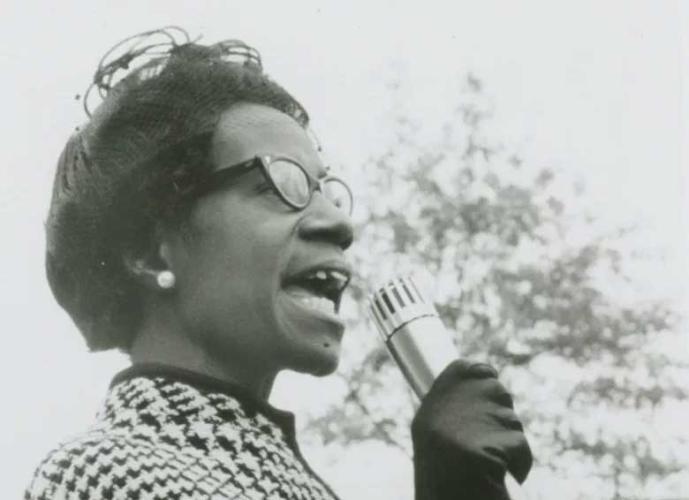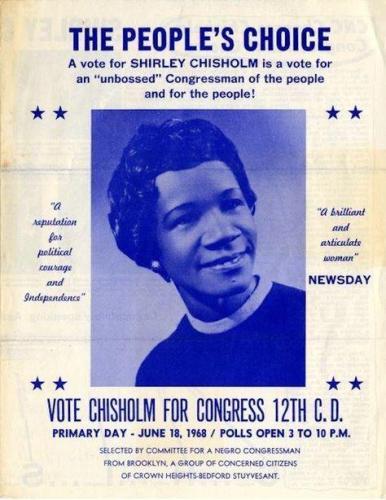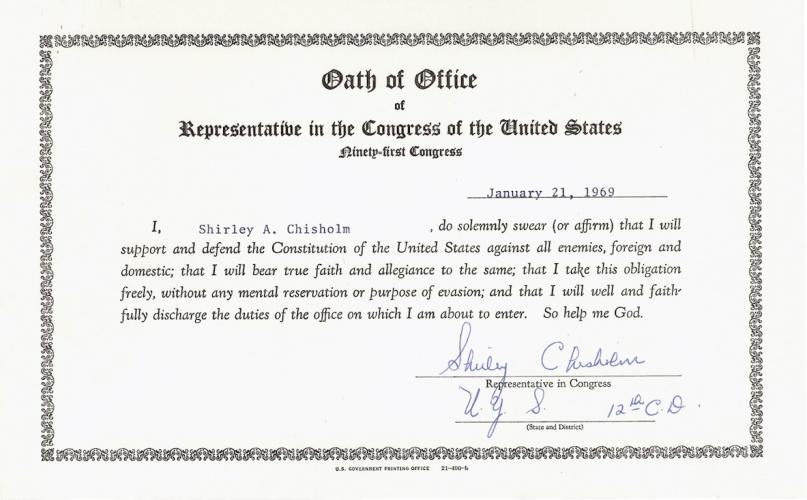
Shirley Chisholm in 1968. Library of Congress Prints and Photographs Division
By Erin Dowdy, Internship Program Coordinator at Smithsonian American Women’s History Museum
Barbadian American Shirley Chisholm was surrounded by politics while growing up, which served as a launching point for her later career path. Her father, Charles Christopher St. Hill, supported activist Marcus Garvey and the rights of trade union members. She witnessed the Barbados workers' and anti-colonial independence movements.
A court-ordered redistricting prompted Chisholm, already a member of the New York State Assembly, to run for Congress as there was now an opening. African American activist, businessman, and journalist Andrew W. Cooper filed a lawsuit under the Voting Rights Act of 1965 against racial gerrymandering. Shirley Chisholm said of gerrymandering “If the word had not existed, it would have been necessary to invent it to describe the congressional map designed to disenfranchise minorities, especially blacks, in New York City before the middle 1960s.” Brooklyn’s Bedford-Stuyvesant neighborhood was divided among five congressional districts, each one represented by a white Congressmember. The Supreme Court ruled in Cooper’s favor, creating New York's 12th Congressional District.
Chisholm announced her candidacy in January 1968. “Starting in February, I spent ten months doing the only thing I could do: I tramped the streets of Williamsburg, Crown Heights, and Bedford-Stuyvesant, telling my story to the people. I didn’t have the money for a conventional campaign. I had to make up for it with hard work. But I was determined to show them. People had to know that it was possible for someone with decency and a fighting spirit to overcome the system by beating it with its own weapon.” She created her campaign slogan: “Fighting Shirley Chisholm—Unbought and Unbossed.” She visited housing projects, churches, parks, and street corners “to talk to anyone who would listen. I shook hands, answered questions, and listened to what the people had to say.”
In the June 18, 1968 Democratic primary, Chisholm defeated City Councilman and former State Senator William S. Thompson, civil court judge Thomas R. Jones, a former district leader and New York assemblyman, and Dolly Robinson, a former district co-leader. In the general election, Chisholm faced James Farmer, the former national chairman of CORE (Congress of Racial Equality), who was running as a Liberal Party candidate with Republican support. Farmer’s campaign was well-funded and highlighted by the media. “The television stations ignored the little female who was running against him…One station I called to complain to came right out and told me why. ‘Who are you?’ the man asked. ‘A little school teacher who happened to go to the Assembly.’”

Pamphlet from Shirley Chisholm’s 1968 Congressional campaign, Rutgers Special Collections and University Archives
Feeling tired and rundown in the midst of her Congressional campaign, Chisholm reluctantly went to a doctor who discovered a massive tumor on her pelvic basin that had been growing for two years, though Chisholm had no pain or symptoms. Although tests revealed the tumor was benign, it demanded an operation for removal. Chisholm had surgery at Maimonides Hospital in late July 1968. By August she was back on a sound truck roaming through the streets saying “Ladies and gentleman, this is Fighting Shirley Chisholm and I’m up and around in spite of what people are saying.”
Farmer focused on Chisholm’s gender, arguing that “women have been in the driver’s seat” in Black communities for too long and that the district needed “a man’s voice in Washington.” Chisholm, instead, appealed to women. “Men always underestimate women. They underestimated me and they underestimated the women like me. If they had thought about it, they would have realized that many of the homes in black neighborhoods are headed by women. They stay put, raise their families, and register to vote in greater numbers. The women are always organizing something…they run the PTA, they are the backbone of the social groups and civic clubs…So the organization was already there. All I had to do was get its help.” Chisholm was also fluent in Spanish—her minor in college—and she spoke directly to the growing Latino population in Bedford-Stuyvesant.
On a cool, clear Tuesday, November 5, 1968 Shirley Chisholm won the general election by a resounding 67 percent of the vote. More than 80 percent of New York's 12th Congressional District registered voters were Democrats. Chisholm drew 34,885 votes to Farmer’s 13,777.

Shirley Chisholm’s Oath of Office, National Archives, Records of the U.S. House of Representatives
In 2018 NPR found a recording of Chisholm’s victory remarks from the evening of November 5, 1968 held by the New York Public Library.
"My dear friends, tonight is a very important night," she told her supporters, "not so much for me, but for you, the people of this community.
"To black and white Americans, although I'm making history this evening, I love to believe that my victory tonight is a symbol of hope for many of us who never dreamt or never believed that we would have had the opportunity to move out into politics.
"And I want to say, to all of the marvelous people in the 12th Congressional District, black, Puerto Rican and white, that without your support and without your faith in me, and without your going to the polls today and telling the world that we have our voice, I would not have made it."
Although Chisholm was the only new woman to enter Congress in 1969, her freshman class included two African Americans who would rise to prominence, Louis Stokes of Ohio and William Lacy “Bill” Clay Sr. of Missouri, boosting the number of African Americans in the House from six to nine, the largest total at that time.
“My significance, I want to believe, is not that I am the first black woman elected to the U.S. Congress, but that I won public office without selling out to anyone.”

Congresswoman Shirley Chisholm playing with children at South Central Community Child Care Center, Los Angeles, 1972. Photo by John Malmin, Los Angeles Times, accessed via Wikimedia Commons.
Related Posts
Erin Dowdy is the Internship Program Coordinator at Smithsonian American Women’s History Museum